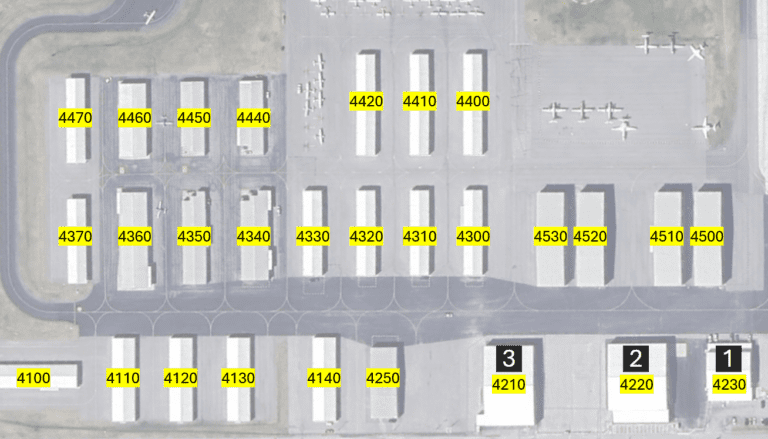John C. Tune Airport®

John C. Tune Airport® (JWN®), located in West Nashville just eight miles from downtown, is one of Tennessee's busiest general aviation airports and serves as Nashville's Executive Airport®. It caters to the needs of regional, corporate, and private aircraft and is owned and managed by the Metropolitan Nashville Airport Authority (MNAA).
JWN Media Relations | JWN Newsroom | Commercial Filming | Airport Data & Reports
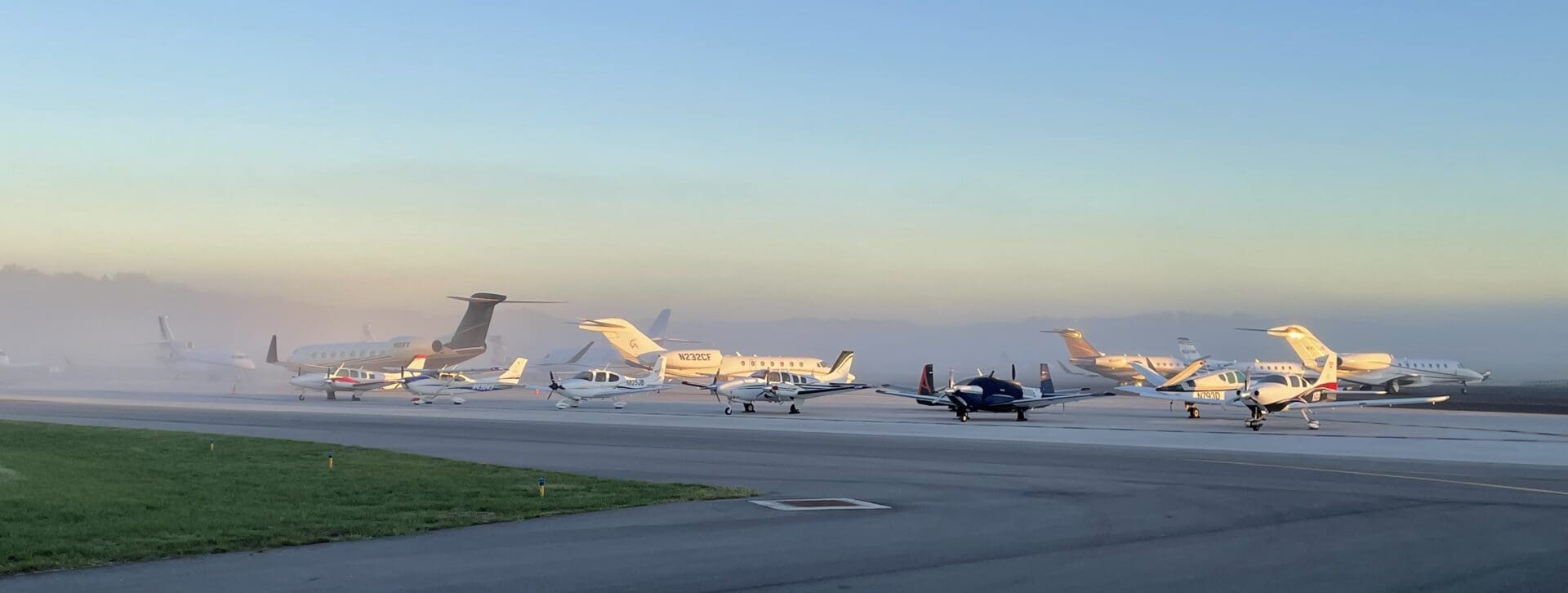
JWN Terminal Building
110 Tune Airport Dr, Nashville, TN 37209
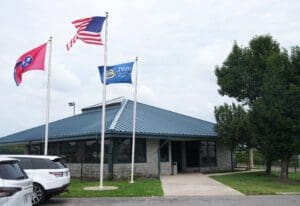
JWN Administration Building
1000 Tune Airport Dr, Nashville, TN 37209
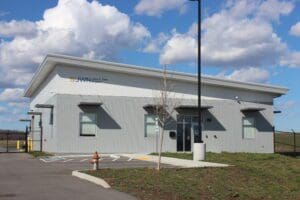
John C. Tune Airport® (JWN®) – Hangar Waitlist
JWN provides rentable hangars for storing airworthy aircraft. If you're interested in securing a hangar and joining the waitlist, please complete this form. Please note: Availability is limited, and submitting the form does not guarantee a hangar.
| JWN Hangar Monthly Rates | |
|---|---|
| Plane Ports | $445 |
| 42' T-Hangars | $640-780 |
| 48' T-Hangars | $785-910 |
| 60' Box Hangars | $2,550 |
| JWN Hangar Monthly Rates | |
|---|---|
| Plane Ports | $445 |
| 42' T-Hangars | $640-780 |
| 48' T-Hangars | $785-910 |
| 60' Box Hangars | $2,550 |
Badging Information
The JWN Badging Office is located at the Administrative Building
Address: 1000 Tune Airport Dr, Nashville, TN 37209
The JWN Badging Office controls the issuance of all identification access badges.
You can apply for identification access badges by filling out both forms below.
ID Badge Application
Applications must be typed; handwritten submissions, other than the signature, will not be processed.
Security Responsibilities Form
Appointment reservations are required and can be scheduled Sunday - Thursday from 8 a.m. to 3:00 p.m.
New and renewal applicants must sign up for an appointment by clicking the Schedule Appointment button above.
Please note, the JWN Badging Office is closed on weekends and the following holidays:
- New Year's Day
- Dr. Martin Luther King Jr. Day
- Presidents' Day
- Memorial Day
- Juneteenth
- Independence Day
- Labor Day
- Thanksgiving Day
- Day After Thanksgiving
- Christmas Day
Pilot Information
| Runway 2-20 Length | 6,001' x 100' |
| Pavement Strength | 97,000 pounds dual wheel |
| Gradient | 0.7% UP NE |
| Airport Elevation | 501 MSL |
| Airport Latitude & Longitude | 36 10' 56" N 86 53' 12" W |
| Unicom | 122.70 |
| AWOS | 127.075 615-350-6222 or 1-800-645-9753 |
| Clearance Delivery | 124.55 |
| Runway Lights | Medium Intensity, PCL* |
| PAPI | RWY 2 RWY 20 |
| REILS | RWY 2 RWY 20 |
| ILS/DME | RWY 20 110.3 |
| *JWN Tower Open 0700-2100 | |
| JWN Tower | 119.45* 615-350-3141 |
| JWN Ground Control | 121.7* |
| Clearance Delivery | 121.7*-124.55 |
| JWN ATIS/AWOS | 127.075 615-350-6222 |
| CTAF | 119.45* |
| Nashville Approach/Departure | 119.35 615-595-4524 |
| BNA Vortac | 114.1 |
| Nashville FSS | 122.55 1-800-WX-BRIEF |
| FBO | 122.85 615-350-5000 |
| Metropolitan Nashville Airport Authority | 615-275-1275 or 615-969-2089 |
| Airport Police | 615-275-1703 |
Our friendly and experienced fixed-base operator (FBO) personnel are available 24/7 to meet your needs, including:
- Avgas and Jet A fueling
- Towing and other ground handling services
- Assistance with any other customer requests
Additional Services On-Site | For your convenience, the following businesses are located right here at the airport:
- Contour Flight Support: Offering flight training, aircraft maintenance, fueling, storage, avionics services, chartering, and sales. Contact them at 615-350-5000.
- Harmony Air Charter: Providing aircraft charters and flight instruction. Reach out to them at 615-350-8550.
- Helistar: Specializing in helicopter flight training. You can call them at 615-350-1122.
- Pro Aircraft Cleaning Services, LLC: Offering professional aircraft detailing services. Contact them at 615-847-0165.
- PSI: Providing computer testing services for pilot certifications, licenses, and other general testing needs. Call them at 615-604-1640.
- Wingnuts Aviation, LLC: Offering aircraft maintenance services. You can reach them at 931-302-4985 or by email at chris@wingnutsaviation.net
- Wings of Eagles: Providing flight instruction. Contact them at 615-979-9222.
Terminal Building | Our 3,600-square-foot terminal offers a comfortable and convenient experience for pilots and passengers:
- Pilot Lounge: Relax and unwind in our lounge equipped with DirectTV.
- Conference Room: Host meetings or training sessions in our spacious room accommodating up to 20 people.
- Break Room: Enjoy a variety of snacks and beverages from our vending machines.
- Bright and Airy Lobby: Our lobby features two large skylights, creating a welcoming atmosphere.
- Convenient Restrooms: Easily accessible restroom facilities.
Terminal Building Address: 110 Tune Airport Dr, Nashville, TN 37209

Hangar and Storage Solutions | JWN provides a range of hangar and storage options to meet your needs:
- Executive T-Hangars: Choose from 123 executive T-hangars for secure aircraft storage.
- Executive Box Hangars: Enjoy added privacy and convenience with our 12 executive box hangars.
- Premium Shade Hangars/Plane Ports: Protect your aircraft from the elements with our 10 premium shade hangars.
- Aircraft Parking and Apron Space: We offer ample parking and apron space for up to 29 tie-down aircraft.
JWN Administration Building Address: 1000 Tune Airport Dr, Nashville, TN 37209

Taxi, courtesy transportation, and car rental services provide quick access to nearby hotels/motels and the outstanding entertainment and recreational opportunities of Nashville.
For more details on car rentals, contact the fixed-base operator (FBO), Contour Aviation, at 615-350-5000
Terminal Building
- Address: 110 Tune Airport Drive, Nashville, TN 37209.
- Take Interstate 40 West to Exit 204.
- Go north on Briley Parkway for approximately 1.6 miles to Exit 26B (Centennial Boulevard West).
- Travel approximately one mile on Centennial Boulevard West through the stop light where Centennial Boulevard West becomes Cockrill Bend Industrial Drive.
- Turn right onto Tune Airport Dr (you will see the John C. Tune Airport sign)
- Turn right before the sign into John C. Tune Airport entrance, and follow the road for 0.7 miles to the terminal on the left.
JWN Administration Building
- Address: 1000 Tune Airport Dr, Nashville, TN 37209
- Take Interstate 40 West to Exit 204.
- Go north on Briley Parkway for approximately 1.6 miles to Exit 26B (Centennial Boulevard West).
- Travel approximately one mile on Centennial Boulevard West through the stop light where Centennial Boulevard West becomes Cockrill Bend Industrial Drive.
- Turn right onto Tune Airport Dr (you will see the John C. Tune Airport sign)
- Take an immediate left turn to the JWN Administration building
Follow the links for more information about what to expect for your arrival at John C. Tune:
Helpful Phone Numbers
| Metropolitan Nashville Airport Authority | 615-275-1275 |
| Airport Police | 615-275-1703 |
| JWN Tower | 615-350-3141 |
| BNA Tower Approach/Departure | 615-695-4524 |
| Fixed Based Operator (FBO) - Contour Aviation | 615-350-5000 or jwnfbo@flycfm.com |
| JWN ATIS/AWOS | 615-350-6222 |
About JWN
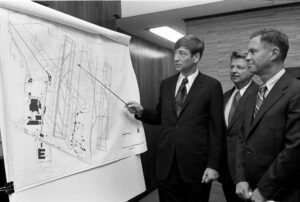
In the late 1960’s, a group of innovative members of the Nashville community, led by pilot, attorney, businessman, and civic leader, John C. Tune, realized the need for a facility to better serve small general aviation (GA) aircraft. In 1972, the Metropolitan Nashville Airport Authority (MNAA) initiated a general aviation site study and the FAA approved a site in the Cockrill Bend area located in West Nashville.
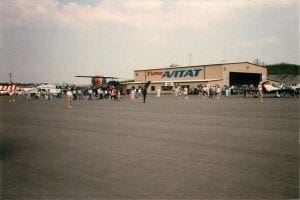
In 1983, construction began on JWN and by July 1986, the Airport was ready to open its doors to the public. With approximately 300 acres of property, JWN became vital to the economic health and progress of the middle Tennessee region. The new GA reliever airport opened with a 5,000 foot by 100 foot runway and one 10,000 sq. ft. conventional hangar.
In 1986, an additional 10 T-hangar units were added. By 1988, the Airport constructed 44 additional T-hangar units and an 18,000 sq. ft. conventional hangar, as well as added a localizer and associated distance measuring equipment (DME). An automated weather observation system (AWOS) was installed and commissioned in 1990.
In 1991, a 500 foot runway extension to the north end of Runway 2-20 was completed. A terminal building was constructed in 1995, which included amenities such as: pilot’s lounge, flight planning room, weather information center, conference room, vending area, restrooms and showers.
Twenty additional T-hangars were constructed in 1996, and with the installation of a glide slope, an instrument landing system (ILS) was added to Runway 20. A global positioning system (GPS) non-precision approach for Runway 2 and another 20 T-hangars were completed in 1998.
In 2006, thirty-one T-hangars were constructed on the south ramp, and Taxiway R3 was constructed to create a second entrance to the main terminal ramp. In 2007, an 18,000 sq. ft. clear span hangar was constructed for aircraft storage, along with 2,500 sq. ft. of office space on the landside portion of the hangar. Four years later, Taxiway R1, connecting the south ramp to the airfield, was constructed along with another 8 T-hangars on the south ramp.
In 2012, the Authority began planning for major airfield renovations at Tune. The purpose of the airfield renovations was to enhance the Runway Safety Areas (RSA). The Federal Aviation Administration (FAA) requires that airports have a standard RSA where possible. The required RSA dimensions for JWN are 500 feet wide by 1,000 feet beyond each end of the runway.
In 2013, Centennial Boulevard north of the airport was closed, Cockrill Bend Circle was extended and site preparation for the runway and RSA extension was completed. In 2015, the north end RSA was extended 500 additional feet to meet the FAA requirement. On the south end, the RSA was extended 750 feet and an Engineered Material Arresting System (EMAS) was added. EMAS uses crushable material placed at the end of a runway to stop an aircraft that overruns the runway. The tires of the aircraft sink into the lightweight material and the aircraft decelerates as it rolls through the material. EMAS is FAA approved and recommended when the standard 1,000–foot RSA is not possible.
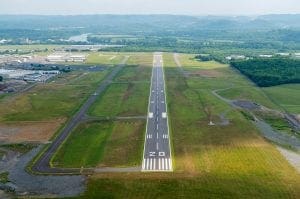 In addition to enhancing the RSA, the runway was extended from 5,000 feet to 6,000 feet, runway grade repairs were completed, runway lights and signage replaced, a new precision approach path indicator and instrument landing system installed, taxiways reconstructed and Taxiway A extended.
In addition to enhancing the RSA, the runway was extended from 5,000 feet to 6,000 feet, runway grade repairs were completed, runway lights and signage replaced, a new precision approach path indicator and instrument landing system installed, taxiways reconstructed and Taxiway A extended.
Landside improvements were completed concurrently with the airside projects. The apron and hangar floors were rehabilitated, landscaping and signage enhanced and the terminal was renovated.
JWN was honored with the 2015 General Aviation Airport Safety Award from the Federal Aviation Administration's Southern Region Airports Division and the Honor Award from the American Council of Engineering Companies of Tennessee for the airport's safety upgrades and enhancements.
In 2016, JWN was named Airport of the Year by the Tennessee Department of Transportation's Aeronautics Commission and the Tennessee Aviation Association for the major reconstruction and safety enhancement projects and terminal modernization at the airport.
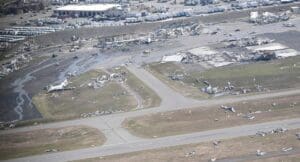 JWN suffered extensive damage in an EF-2 tornado on March 3, 2020. The infrastructure damage to JWN alone was estimated at $93 million, not including any assessments of personal property damage, such as aircraft and vehicles. Over 90 aircraft were destroyed, along with 17 hangars that sustained damage or were completely destroyed.
JWN suffered extensive damage in an EF-2 tornado on March 3, 2020. The infrastructure damage to JWN alone was estimated at $93 million, not including any assessments of personal property damage, such as aircraft and vehicles. Over 90 aircraft were destroyed, along with 17 hangars that sustained damage or were completely destroyed.
Starting in July 2020, the Metropolitan Nashville Airport Authority (MNAA) formulated a comprehensive redevelopment plan to rehabilitate and expand airport facilities at JWN. Construction on the $38.8 million project commenced in February 2021.
The restoration and improvement plan included the development of 100 hangars and plane ports, with the last one becoming operational in May 2022.

